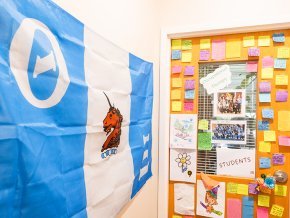Grant to support development of resources exploring vocational discernment
A grant has been awarded to Lenoir-Rhyne University through the Council of Independent Colleges (CIC) Network for Vocation in Undergraduate Education (NetVUE) to develop resources that recognize the impact of trauma on an individual’s readiness for vocational discernment.
The $44,500 grant through NetVUE’s Program Development Grants will provide funding for two years, starting this fall 2022, for the university to explore how traumas in a student’s life or background – such as abuse –influence their decisions about vocation – a sense of calling in the world.
“In most of the books currently available, assumptions are made about a student’s position of privilege – but they do not cover, for example that a student might come from a family that experiences dysfunction in an extreme way,” said the Rev. Dr. Mindy Makant, newly appointed dean of the College of Humanities and Social Sciences and associate professor of religious studies. “It certainly doesn’t assume a student has come to this place of discernment with a background of trauma, whether physical or emotional or even health-related trauma. One of the things that I think the pandemic has collectively helped us recognize is that none of us are making vocational decisions outside of the experiences of trauma.”
Makant, also the director of the youth and family ministry program and director of the Living Well Center for Vocation and Purpose, is working with a team of faculty and staff members from Lenoir-Rhyne’s three campuses to collectively explore more in-depth vocational discernment. For example, what goes into these decisions and how are people navigating their many roles in life?
“Recognizing that whatever the answer to the questions posed is often, if not always, shaped by experiences of trauma and that can be limiting. How do we help people recognize that, name that and then create a space to find the most freedom to do that thing to which they are called?” Makant said.
Based on the research conducted in the first year of the grant, the team hopes to develop a prototype in the fall 2023 semester to test it on campus and then implement the resources in the classroom.
“I hope that this makes a positive difference for our campus, our community and our students,” Makant said.

A shining night of celebration and community, the Student Life Awards returned to honor the passion, leadership, and spirit that define LR’s campus life.
View More
Beloved professor. Inspiring mentor. Joyful presence. Lenoir-Rhyne remembers Dr. Toni Smith Oakes, who shaped the heart and spirit of the OT program.
View More